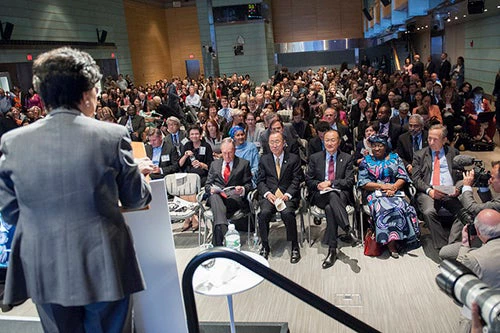This blog originally appeared on April 28, 2014 on The Rockefeller Foundation website.
This year’s World Bank Spring Meeting featured a blockbuster event on health entitled, Toward Universal Health Coverage by 2030, featuring United Nations Secretary-General Ban Ki-Moon, World Bank President Jim Kim, Harvard Professor Lawrence Summers; Nigeria’s Minister of Finance, Ngozi Okonjo-Iweala; World Health Organization Director-General Margaret Chan, and former New York City Mayor Michael Bloomberg. Following this event, the French and Japanese Missions to the United Nations in New York co-hosted a panel discussion at the United Nations on national experience implementing and measuring universal health coverage citing examples from Chile, Benin, and Thailand; and presentations from both the World Health Organization and the World Bank.
There is a growing consensus that universal health coverage should be an umbrella goal for health in the post-2015 development framework. Given its importance for the future of global health, here are some of the best resources to better understand universal health coverage (UHC):
What is Universal Health Coverage?
Everyone is talking about universal health coverage, but what does it mean exactly, and why is it important? Joe Kutzin explains it in simple and easily understandable language.
Why Focus on Universal Health Coverage?
The recent Lancet Commission on Investing in Health chaired by Larry Summers concluded that universal health coverage is one of the most compelling investments a government can make. As a joint UNICEF-Save the Children-WHO-Rockefeller Foundation report showed, UHC also addresses equity. But UHC is not just the right economic approach or best way to address equity, it is also, as a group of leading international lawyers recently argued, the practical expression of the human right to health.
The National and Global Policy Campaign
The landmark Lancet paper, All for Universal Health Coverage, published in August 2009 by Laurie Garrett, Mushtaque Chowdhury, and Ariel Pablos-Mendez sets out the vision for a strong national and global policy advocacy campaign for universal health coverage.
Access to Health Services Without Financial Risk
The 2010 World Health Report on Health Systems and the Path to Universal Health Coverage: Led by David Evans, this report played a critical role in synthesizing and articulating a framework to understand how countries reform health systems that ensure access to health services for all without financial risk. This report later led World Health Organization Director-General Chan to declare that universal health coverage is, “the single most powerful concept that public health has to offer.” Additionally, the World Health Organization focused its 2013 World Health Report on Research for Universal Health Coverage.
Impact on Population Health
The Lancet’s themed issue on Universal Health Coverage: This collection of papers and comments includes a viewpoint from Jeff Sachs looking at UHC in low and middle-income countries, and an assessment of the evidence of how UHC impacts population health. There have also been a number of papers and series assessing progress towards UHC in Mexico, Turkey, Bangladesh, Rwanda, India; in Arab uprising countries Tunisia, Egypt, Libya, and Yemen; and in Southeast Asia.
Case Studies From 22 Countries
The World Bank’s Universal Health Coverage Study Series: The World Bank compiled twenty-two country case studies of national efforts from Brazil to Vietnam to move towards UHC as part of its broader health efforts focused on universal health coverage. The analysis and work behind these studies contributed to World Bank President Jim Kim declaring at the World Health Assembly in 2014, “We must be the generation to deliver universal health coverage.”
Role in Global Health
Action for Global Health’s briefings on Universal Health Coverage: Action for Global Health is a broad network of more than thirty NGOs. Their call to action and briefings on the intersections of UHC and sexual and reproductive health rights, nutrition, WASH, and tuberculosis are excellent resources. More recently, Jonathan Quick, Jonathan Jay, and Ana Langer wrote a paper on Improving Women’s Health through Universal Health Coverage.



Join the Conversation